|
|

blackknighthistorical.co.uk
Digger
talks to Ian Pycroft whose company Black Knight Historical
provides fascinating and impressively ambitious, authentic and
well-researched costumed interpretations of historical events
and characters spanning the last 2,000 years of history.
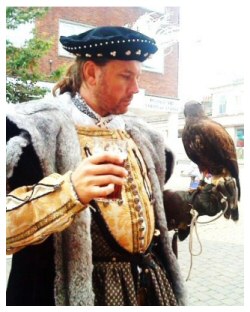
Henry VIIIth with hawk
and ale
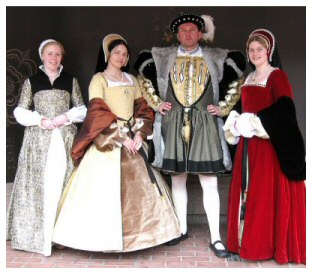
Henry VIIIth era
costumes
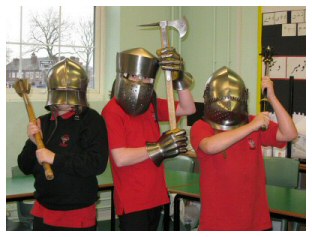
School fun
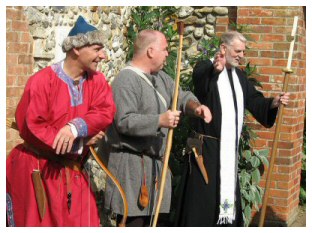
Feudal archers
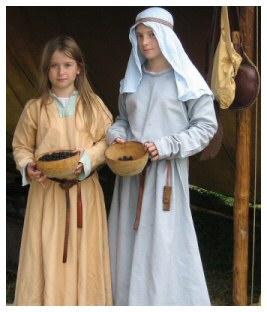
Saxon maidens
Ian:
Good morning,
Black Knight
Historical...
Digger:
Morning Ian. How are you?
Ian: Hello
David. I'm good
thanks.
Digger:
I spent a lot of
time looking at
your website
last night. And
I was also
looking at the
image galleries
and there were
so many great
photos I
couldn't make up
my mind which
ones I liked so
I downloaded
lots of them.
(Laughs) There's
some good stuff
there. They
cover a lot of
eras and a wide
range of events,
don't they?
Ian: They
do. I'm very
pleased with
them.
Digger: Can
you please tell
us about your
background and
how Black Knight
Historical came
about?
Ian: My
own personal
background - educated
at Paston
Grammar school
in north
Walsham. Their
claim to fame
was that Horatio
Nelson went
there, a famous
son of Norfolk
and a great
British hero.
The school was
founded in 1606
so it does give
you quite a
historical
context. I lived
just over the
road from the
school for a
number of years
and it was an
inspiration. I
loved history at
school.
Digger: Why
was that?
Ian: I
don't know,
things just
touch you
sometimes, don't
they?
Digger: Yes
they do.
Ian: I
was asthmatic, so
I wasn't particularly
good at PE and
that sort of
stuff. The
history side of
things certainly
appealed and I enjoyed
studying at
school.
Digger: That'
almost ironic
because you're
out and about
and active all
of the time
these days.
Ian: I've
almost got rid
of it and it
only gets me now
if I'm feeling
under the
weather - touch
wood I'm pretty
good now.
Digger: The
business itself
- was that a
series of
accidents or how
did it come
about?
Ian: (Laughs)
A series of
accidents. Isn't
everything in
life?
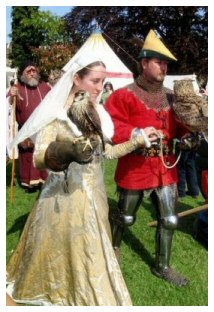
Guinevere and Lancelot
Digger:
That's right.
I'm talking to
lots of people
all the time who
are running
retro, vintage
and
nostalgia-based
businesses and
they all share a
joy and a
passion for what
they do but a
common theme is
that they ended
up doing what
they are doing
as a result of
unplanned
events.
Ian: Well,
I suppose after
leaving school
and college I
was unfulfilled
and didn't know
which direction
to go in and
ended up in a
retail career which
was obviously
not for me long
term. Too many
interests in
history and
historical
reconstructions.
And once I found
myself in that
world I wanted
to do more and
more quality
things. And the
event
management came
as a result of
doing lots of
events for other
people and the
hobby groups
around Europe.
What got me
interested in
'the dressing
up' side, for
want of a better
phrase, was a
combination of
an interest in
mediŠval arts
and armour and
role-playing and
such things that
were prevalent
in my youth and
formative years.
I wanted to
experiment to
see what it
would be like to
wear a suit of
armour and that
got me in
contact with a
local group in
Norwich called
The Norwich and
Norfolk MediŠval
Association.
Digger: The
British spelling
of mediŠval
rather
than the
American?
Ian:
Yes, with a
proper diphthong.
There are not
many people who
know what they
are. That was
back in 1985
before
re-enactment had
been coined as a
term.
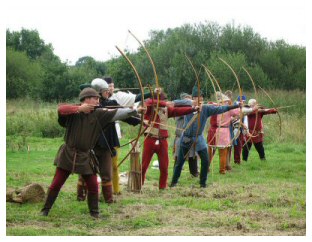
MediŠval
archers
Digger: It's
quite a broad
brush now, isn't
it? Looking at
your website and
photos.
Ian: You
can see the sort
of things we get
up to.
Digger: Yes.
Ian: And
just making
people happy is basically
what Black
Knight do, with
a historical
twist. Educate
them, entertain
them - there is
this new buzz
word called
"Edutainment"
(Digger winces)
I don't like it
either - I'm
happy to use
real words
rather than
invent words to
describe what we
do. And so
there's a number
of slightly different
services we
provide -
costumed
interpretation
and living
history. Bringing
characters to
life in a
stately home or
a castle who are
actually representing
real people from
the past.
Digger: When
we went to Hampton
Court it was
great because
there were all
these people
dressed up in
the
authentic-looking
gear and they
really are good
actors.
Digger: Rather
than just
walking around
the palace,
which is just a
lot of empty
rooms really in
that sense,
these actors and
role players
bring it to
life.
Ian: They
are very good
down there -
they are
costumed interpreters
and they know
their stuff and
are prepared to
talk to you,
usually in role
as well.
Although
there's two
types of
costumed
interpretation,
depending on
whether you're
doing it in the
first person or
the third
person.
Digger: I
see.
Ian: First
person is
"I am
and I am going
to make you
believe that the
year is 1525"
and
everything they
say to you will
be appropriate
to that year and
be the society
and lifestyle
that person
would have known
and experienced
at that time.
They will ignore
planes flying
overhead or
mobile phones
going off and
just treat them
as though they
don't exist.
That's quite
nice and can
work very well
indeed if you've
got somebody
who's good doing
that.
Digger: You
have to suspend
that disbelief
just as you do
if you're at the
theatre.
Ian: Absolutely.
If you do third
person, so
you're talking
to the public as
though you're a
modern person
and say
"This is
how it was done
back then"
using the past
tense and
talking about 'them' rather than
'I'.
Digger: I
think the former
one works best
for me.
Ian: First
person works
very well, but
you do need
people who are entertaining
and have got the
knowledge to be
able to carry
that off.
There's no point
in doing first
person if you
can't answer
simple questions
about the particular
period you're doing.
Digger: No.
Ian: You
have to have
more confidence
to do that and
more training is
required.
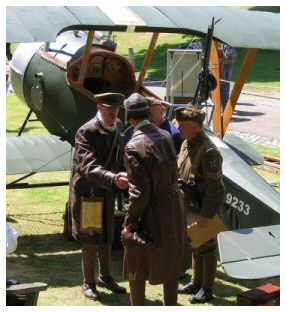
World War I flying
display
Digger: Can
you tell us
about The
Mannington Hall
event?
Ian: Certainly.
The Norfolk
Living History
Fayre - this is
the fourth year
of doing it, is
2,000 years of history
presented in one
of Norfolk's
most lovely
locations.
Digger: Not
ambitious then?
(Laughs)
Ian: It
is ambitious and
I'm proud to
make it so.
English Heritage
run a flagship
event every year
at Kelmarsh
called The
Festival of History
which is a much
larger and
grandiose
version of what
I try and do
here. This is my
own humble,
Norfolk-based
version of it
and it's set
inside the
grounds and
inside of
Mannington Hall
which is the
actual home of
Lord and Lady
Walpole, so a
nice Norfolk
connection there
with our first
Prime Minister.
And it's a
fifteenth
century moated
manor house.
Digger: How
many people do you expect to
go?
Ian: We've
probably got 300
performers,
which is no mean
number and I'm
hoping for 3,000
members of the
public. I have
two of the
world's best
jousters coming
along this year,
so I hope we get
more visitors.
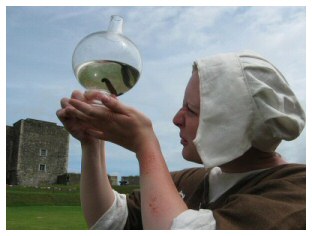
Dover castle -
leeches!
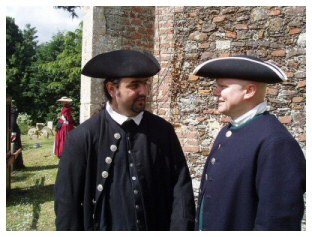
Hogarth's heroes
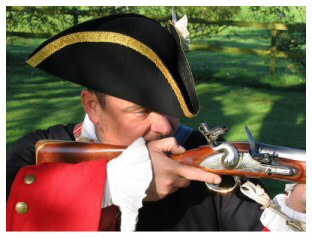
Lace wars
Digger:
How do you judge
that, them being
the world's
best? Do they
still meet up in
some field in
France each year
like they used
to in 'the old
days'?
Ian: Almost
right. There are
a number of
jousts that
happen around
the world now
it's an international
sport again.
Teams from
Australia, New
Zealand, Canada,
America, Britain
, France, and the
best exponents
of them regularly
meet. These two
who are coming,
Dr Toby Capwell
and Dom Sewell, regularly
joust at place
like The Royal
Armoury in Leeds
and Hampton
Court and The Tower
of London. Toby
is curator of
arms and armour
at The Wallace
Collection in
London. He's
doing it from a
position of authority
and the two of
them put on a
very special
show. I've got
people flying in
from America especially
to see them
joust. They have
their own, I
won't say cult
following, but
they're both
members of the
jousting team
called The Order
of the Crescent
and they're half
of a four man
team.
Digger: I'm
just bringing to
mind poor old
Tony Curtis who
died yesterday.
He appeared in
The Black Shield
of Falworth and
other sword and
sandals
Hollywood movies
and didn't do
the genre any
harm, getting
people
interested in
history in a
way.
Ian: Absolutely.
The modern
jousters wear
modern armour,
hand-forged in
steel plate and
I think armour
can fetch
ú30-40,000.
Digger: Just
a couple of obvious questions.
Do people ever get hurt?
Ian: Yes,
of course they
do.
Digger: And
the size of
people - you'll
see the old
armour, the
horse amour too,
and think were
they smaller
then. Were they
that much
smaller?
Ian: I
think there's a
number of
answers and I don't
think they were
that much
smaller than we
are today. There
are definite
cases where
people were
small but the
best way to find
out someone's
height is to
measure the
coffins, of
course. I would
say their diet
wasn't as heavy
as ours is today
and we probably have
the benefit of
some of the best
dietary and nutritional
times.
Digger: At
least we have
the choice of
even if some of
us choose not to
take advantage.
Ian: Absolutely.
But they were
fit men in heavy
armour and you
had to be
reasonably fit -
you can't run
around and do
these things if
you're unfit and
you'll see this.
Obviously they
do a lot of horse riding
too.
Digger: What's
the best time to
get there?
Ian: It
starts at 11:00
- it's October
and the day is
getting shorter.
To give people a
chance to get
there, although
it is well
signposted with
yellow
directional
signs, but 11:00
gives people at
least five hours
on site and they
get a day of diverse
entertainment
with lots of child-focused
activities as
well. And there's
free admission for
kids.
Digger: What's
our fascination
with historical events
and characters?
Ian: I
think since
having been
following
re-enactment and
been developing
the business
with the way
it's grown, like
any business,
once it starts
to become
popular and
people get more
interested in
the past, so a
set of service industries
and suppliers
and
manufacturers
are building up
to further the
need. And now
you can quite happily
trawl the web or
attend
historical
pageants like
Mannington and
find traders and
manufacturers
and
demonstrators of
historical
crafts, all of
whom are
providing products
and services to
enable this reconstruction
to happen. If
you have an open
cheque book, you
can happily
wander through a
market or fayre
and pay your
money and walk
away completely equipped
in something
that took me twenty
years to achieve.
Digger: The
whole infrastructure is there.
Ian: The
whole thing is
there and the
only restriction
now is on the size
of your cheque
book or bank balance.
But with that is
brought the danger
that people can
do that now
without doing
the historical research.
And I've got a
big library here
which is full of
historical
reference books
which try and
back up the
personas and the
knowledge that I
find necessary
to bring the
past alive in a
credible way.
Digger: To
avoid it being a pastiche.
Ian: Yes,
otherwise it's
just like going
and buying a caravan
and having a
holiday. There
are, in every
sport or every
theatre of pastimes,
there's different
levels of
quality and the
poor quality
does, unfortunately,
bring the hobby
down and lead to
ridicule in some
ways.
Digger:
I went to an event called The
Battle of Malden and it was commemorating
a battle in Essex 1,000 years
before. I can't recall
when.
Digger: Thank
you. And the
crescendo was
the burning of
the Viking boat
in the estuary.
There was a village,
which was great
and they'd built
stands for the
public. But,
there were two
'armies' and
each only had a
handful of men.
When they were
'killed' they'd
lie down and
then sneak away
and rejoin the
battle. It
wasn't very
convincing or
entertaining,
apart from us
laughing.
Ian: Back
in 1991, as a hobby,
there probably
weren't enough
people to take
part. Now you
can put 1,000
people, possibly
2,000 people, on
a battlefield.
Even then,
watching
mediŠval battles
is like watching
paint dry to me.
Fortunately, health
and safety is a
double-edged
sword - to use
that phrase...
Digger: Good
one!
Ian: ...
Today, we obviously
have
to make
things as safe
as possible. Because
people
then have to go
and do their
real job on a
Monday morning.
But, you don't
get realism and
that's good
actually,
because mediŠval
or historical
battlefields
were horrific
places to be and
you wouldn't want
to wish that on
your worst
enemy.
Digger: No.
Ian: To
see and
experience the
carnage
and
realities of
warfare, before
and after
gunpowder and
cannon were introduced.
Digger: We're
very creative at
finding ways to
knock the
wotsits out of
each other,
aren't we?
Ian: Absolutely.
Not just in the
battles, but we
do live in more
enlightened
times,
fortunately, and
it does give us
the chance to do
this, and we can
and show
things like
crime and
punishment of
the past. The
power or religious
thought, for
example.
Digger: Grrr.
Don't get me
started on
religion! I went
to a Catholic
Jesuit Grammar
school and
religion has
caused so much
of the trouble
in the world.
Ian: You
can see that
with The
Inquisition. For
us to be able to
show how the
instruments of punishment
and
torture
functioned and
why people believed so
passionately in Catholicism
and
then why we end
up with The Reformation. Digger: I
love the pictures
of the
scold's bridle.
And what would your crime have
to be to be hung
up by the ears?
(Both laugh)
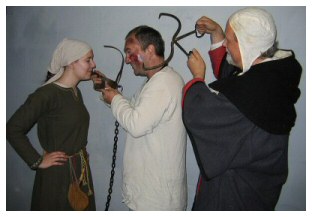
Scolds bridal and
hanging up by the ears
Ian: I
don't know
exactly.
Digger: And
would you be let down once you'd
promised not to do it
again?
Ian: Probably
not. You've got
to remember that
among that
barbarity there
is some
beautiful
artwork and some
wonderful things
coming out of
The Middle Ages
and The
Renaissance. But
in The
Renaissance,
this new era of
learning and
refinement which
swept across
Europe, we were
finding more and
more ways to
hang, draw and quarter
people
and more torture
devices. The
rack really
comes into its
own in the
sixteenth
century and if
you really want
to know about
horrific ways to
torture and
mutilate people
then just look
at what The
Germans were up
to. Surprising,
isn't it? But I
think that each
nation and
culture has its
own methods of
extracting
information, and
torture and punishment. And
fortunately
those days are
gone.
Digger: You
travel the
length and
breadth of the
UK and your
events cover
over 2,000 years
of history. What
are the
challenges you
face when
planning and
organising these
events?
Ian: Historical
integrity and
making sure that
all the performers
are
up to standard
of their kit and
equipment and
behaviour. And
their ability to
communicate -
the ability to interact with
the public and
deliver a
quality product.
My interpretation
of quality
product means
not having to
constantly look
over their shoulders
but I
often go round
shows when I'm
not performing.
I might just
introduce
myself and watch them as a
member of the
public.
Digger: I
was in heaven a
couple of years
ago because I
went to Duxford
and that was
fantastic - they
had all the WWII
re-enactors there
and the pilots scrambling
for
their Spitfires
but they also
had some of the
real Battle Of Britain
pilots
there as well.
Digger:
What a wonderful
day but they
also had, and
what I enjoyed
most, was a
bit big boys
toys - they had
the
anti-aircraft
guns and the
searchlights and
the barrage
balloons and so
on. I love to
see all that
equipment in
original order
and working.
Ian: We
are at Duxford
in four week's
time. I'm there
doing a 617 Squadron
Dambusters pilot
on the 30th and
31st October.
Digger: You
have actually
got the job from
heaven haven't
you, really Ian?
(Laughs)
Ian: I
have the WWII
full flying kit
from 1942/'43
onwards. Digger: I
saw you were squadron
leader Johnny
Ball.
Ian: Yes,
totally
fictitious but
the idea that
balls bounce and
he takes on the
camaraderie and
humour of them
all having
nicknames at the
time.
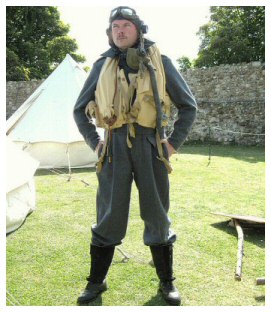
Squadron Leader John
'Bouncer' Ball
Digger:
Is that a bouncing
bomb in the
photo on your
site? Is that
how big they
were?
Ian: Yes,
that is Upkeep -
a thousand
pounds in weight
with a 4,500
pounds explosive
Torpex core.
Digger: It
doesn't look
very
aerodynamic.
Ian: It
didn't need to
be because it
was, as you
know, designed
to skip and was
slung underneath
the Lancaster bomber
rather than
inside the bomb
bay and with a
motor running at
600 r.p.m. to
make it spin
backwards. Digger: What
are your
historical
passions?
Ian: Oh
dear! How
long have you
got? (Laughs)
Right - the De Haviland
Mosquito,
fifteenth
century England
- The Wars of
The Roses period
and The Swiss
Burgundian Wars
appeal to me. I
love pageantry
in the middle
ages and the colour
and spectacle
and I'm
interested in
religion -
theology rather
than personal religious
belief, and in the history
of religion.
That includes
the, shall we
call it
anti-religion,
which in common
culture would be
described as
witchcraft and heresy
and that kind of
thing. I'm
interested in
it, not
practising it of
course, but I'm
interested in
how it all
evolves and
things like
witch trials and
such things. I'm
gradually
getting more and
more into The
Romans -
"What have
The Romans ever
done for
us?"
(Digger
laughs)
Digger:
Obviously you
learned Latin at
school like I
did and at the
time I thought
it was useless
but it gives you
an insight into
things and
actually proves
quite useful.
Not a week goes
by when I don't
see a word or
hear a phrase
and can work out
what it means
based on Latin.
Ian: Yes,
I've got some
really funny
ones when I do mediŠval
banquets and I
cut and paste
them out and let
the visitors
have little
quips on bits of
parchment or
card which I put
in front of them.
Then they have
to try and work
out what they
mean. One of
them, which I
can't remember
the translation
for, is "Do
I drink this or
is it for
washing my
fingers?"
referring to the
little hand washing
bowl. Just some
funny little
quips. And I have
got a couple of
those funny
Latin phrasebooks
knocking around
on my shelves
somewhere. But
can I find them now?...
Digger: No,
that would be
useful!
Ian: Exactly.
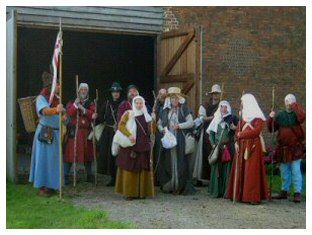
Pilgrims at Foulsham
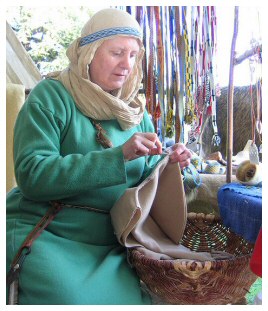
Saxon
village crafts
Digger:
One thing that always
fascinated me
was about the
wedge formation
of the Roman soldiers
when they were
in battle. That
was so effective
so that no
matter how
people were
coming at them
they could break
through with
maximum impact
and minimum
losses. And it
retained the
integrity of the
formation to
drive through
anything. Ian:
Pretty much,
yes. Digger:
What sort of
feedback do you
get from your clients? Ian:
Usually very
positive. I
can't think of a
situation where
I've put on a
poor show or a
bad show and
where we haven't
been gratefully
received. There
are testimonials
on the website
as I'm sure
you've seen and
they fairly reflect
the quality and
diversity of
what we offer. Digger:
That doesn't
mean that you're
complacent.
You're always
looking at new
things to do and
ways to improve
or enhance? Ian:
Yes, that's absolutely
right. Going on
from my passions
that we were
discussing, I'm
constantly
developing new characters
as you've
probably
gathered. The
eighteenth century
humanitarians
are something
that I'm getting
interested in
right now,
people like
Wilberforce and
Howard. I'm
fascinated by
them and their
anti-slavery and
prison reform
work. Their work
is probably under sung
and I'm quite
interested in
them and brining
those two to
life. Nineteenth
century
scientists, archaeologists
- I played Fox
Talbot this year
down at his home
at Laycock Abbey
and it was
fantastic. We were doing
photographic
pioneering shows
and a colleague
from Wales come
over with all
his original and
repro
Victorian-style
full plate
cameras so we
were doing wet
collodion and
pinhole camera techniques.
But I really
enjoy playing my
World War II
pilot and I'm a
big Mosquito enthusiast
- the De
Haviland DH 98
is by far the greatest
plane of World
War II -
(Laughs) I will
put my neck on
the block there
and it's so under sung.
You can quote me
on that and I'll
wait for the
flak! Digger:
What are the
best things
about running
Black Knight
Historical? Ian:
That I wake up
each morning
knowing that the
day ahead is
going to be fun.
It's a great
life, it's a
hard life and
it's not a
career that's
going to make me
a rich man. Digger:
You must spend a
lot of time in
hotels or
camping? Ian:
Yes, we do spend
a lot of time
under canvas.
During the
course of the
year I would
think fifty days
under canvas a
year. The
company now has
ten tents or so
of different
sizes and shapes
and historical
periods. We keep
adding to and
expanding that
and the range of
costumes and
props keeps
growing. I
have just been asked
to do an
Anglo-Saxon
school day for
the first time
so I'm looking
at getting ninth
century clothing
and artefacts together. Digger:
And as you said
earlier there
are now a lot of
companies who
make these sorts
of things now. Ian:
I've got a
number of
companies now
who supply me
with bespoke historical
costumes, and I
don't like the
word 'costumes' -
historical reproduction
clothes, I
suppose, because
costume still
has a tendency
to be seen in
the pantomime
sense. Digger:
Almost fancy
dress? Ian:
Absolutely, so I
don't like using
the word 'costume'
for that reason.
But it's important
to describe what
we do although at the
same item it's
almost the antithesis
of what we do.
The word is just
not good enough
to describe the
level of
research and
quality and
attention to
detail that goes
into many of
these outfits.
The bespoke
tailoring and getting
people to make correct
patterns and to
use the
authentic
fabrics - silks,
velvets and
furs. Or even
something as
simple as the
most
historically accurate
thing that I
posses, which is a fourteenth
century shirt
and breeches.
These are basically
long drawers,
which are made
from east European
hand-spun, hand
woven linen that
is nearly 100
years old. It
had never been
used and was still
up on the loom
in the roll. I managed to buy
some of that
from an antique seller
and have now
made something
that is the closest
facsimile I've
got. Because this
east European
loom was almost
the same as a mediŠval
one would have
been. Digger:
Does all this mean
that you're probably
living at the
best time, the
best era that you
could possibly
be? Ian:
Absolutely. Digger:
Yes, because
we've got all
this technology
and the
capability and
The Internet
now. Ian:
That's why more
and more people
are exploring
their past and doing
reconstructions. Digger:
And with DNA as
well... Ian:
Exactly, yes. Digger:
... It's almost as
if the past is
coming closer to
us now that at
any other time. Ian:
Yes. We've obviously,
if we wanted to,
got more than
2,000 years of
history to
explore and I
probably will
one day develop
a Neolithic
persona and
wander around
going
"Ug"
with a big club. Digger:
Like on The
Armstrong and
Miller Show? Ian:
Have you seen
their RAF
pilots? Digger:
Yes, they're
great. They've
also got the
Neolithics as
well where they
are trying to
communicate the
birth of modern
ideas and
concepts in
Neolithic-speak. Ian:
The RAF pilots
they do are an
absolute hoot
and the standard
of the sets and
props - they
really are in
well-dressed
form and this
common Chav-speak
that they use. Digger:
Very funny and
Monty Python
used to do that
a lot where
there's the
juxtaposition of
things. Ian:
I hark back to Monty
Python and The
Holy Grail which
is a classic in
its own right.
Films like that,
and the series
Robin of
Sherwood which
is has been
shown again on
TV, these were
inspirations for
me. I despair with
most Robin Hood films
and TV series -
the one with
Michael Praed
has pretty much
nurtured my
interest in that
mediŠval dressing
up thing.
Looking back on
it that was
almost 25 years
ago when that
came out. Digger:
What about Braveheart?
Or is that a
rude question! Ian:
Ooh! It's a
great film but
it's not
historically accurate
and very few of
them are.
In terms of accuracy,
one of my favourite
films is Master
and Commander
with Russell
Crowe as
Nelson's navy
captain. That is
a really nice
film and you get
a good idea of
what it was like
and, yet again,
I'm developing a
Nelson's navy captain
as one of my
costume
personas.
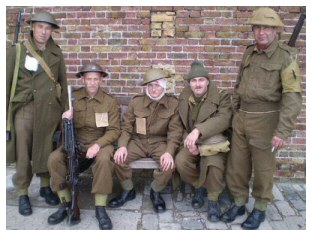
Dynamo evacuees
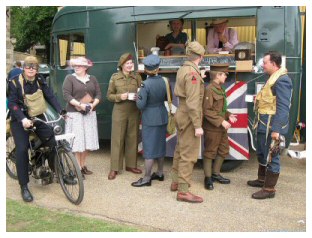
Wartime reenactment -
Peterborough
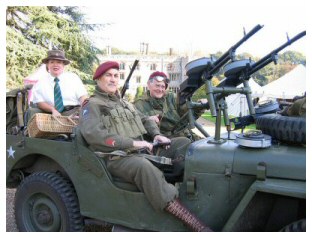
Airborne jeep crew
Digger:
What of the
future for Black
Knight
Historical? Ian:
Lots of new
personas coming
out all of the
time... Digger:
You're the historical
equivalent of
Madonna, Ian.
(Laughs) Ian:
For the future -
what do I see?
Things I will
invest in personally
for me - more
quality costumes
and artefacts so
I can carry on
developing my
own range of costumed
interpretational
characters and
for ones to use
in schools. For
the business -
well I hope all
the clients who
I work for currently
are happy enough
with me that
they want to carry
on using our services
ad infinitum and
also adding and
developing new
ones. It's
always very
pleasant,
of course, to
get a call or an
email from a new
prospective client
- a historic
house or a
castle or a
college or a
school that I haven't
been to before.
And to see where
that's going to
lead and follow that
one to a successful
conclusion. You
never know where
these things are
going to lead
and at the
moment I'm
negotiating with
Blickling Hall
here in Norfolk
for a Tudor Pageant
weekend for the
first time next
year. There are
so many
wonderful historic
buildings - I'm
hoping to get
across to The mediŠval
centre in Denmark
next year. Also,
hopefully, to the ChÔteau
Chillon in
Switzerland,
which is one of
the most
beautiful
looking castles
in the world on
the shore
of Lake LÚman
in Switzerland.
And, believe it
or not, even
with all this history
as a job I still
enjoy doing it on
occasions purely for
the hobby side
of it. I am member
of The Company
of St George
which is a Swiss-based
international
top level living
history group
that portrays a
Burgundian
Artillery
Company of the
Swiss Burgundian
Wars of 1475/'76.
They totally
immerse
themselves in it
24/7. So, unlike
me who is doing
a show over here
which requires
10 o'clock to 5
o'clock and then
at 5 o'clock the
costume comes
off. Digger:
And down the
pub! Ian:
Well, no, I normally
find that sort
of thing doesn't
appeal. Yes, I
enjoy a drink as
much as the next
man, but I feel
too attached to
the presentation
- usually
there's tents
involved and
normally I'll
stay on site for
my own security
and rather than leave
that responsibility
to someone else. Digger:
It's been fascinating
Ian, so thanks
very much for
that and for the
great images as
well. I am
looking forward
to seeing you on
15th/16th
October. Ian:
Thanks David. As
I mentioned,
it's free
admission for
children, so
bring them along
and see you
then. Digger:
Thank you Ian. Ian:
No. Thank you. Digger:
Take care. Bye. Ian:
See you soon.
Bye now.
16th-17th
October
Mannington Hall,
Norfolk. The 4th
Annual Norfolk
Living History
Fayre 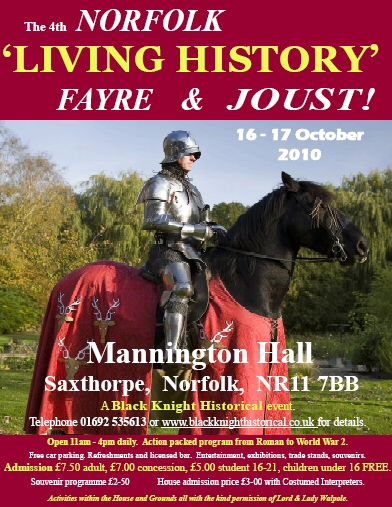
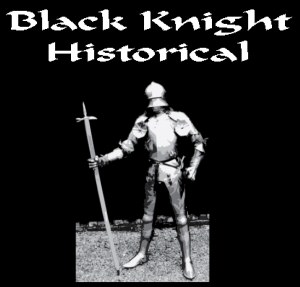
We
specialise in historical event management, and provide
personnel and costumed performance services for heritage
sites, schools, corporate and private clients, film and TV. We
also organise historic markets and fashion shows.
Our
events cover more than 2000 years of history, from the Roman
empire to WWII.
We
offer a wide range of activities for all ages and tastes,
including Living History displays, costumed interpretation,
historic craft demonstrations, mediŠval banquets, lessons for
children and lectures for adults, themed costumed parties,
jousting tournaments, murder mysteries, weddings, corporate
parties and product launches.
blackknighthistorical.co.uk
Contact us: telephone 01692 535613, mobile 07717 482823, email
info@blackknighthistorical.co.uk
|
|